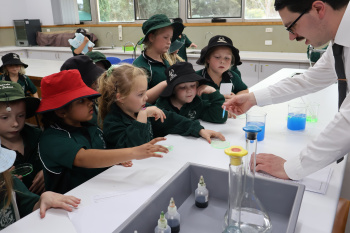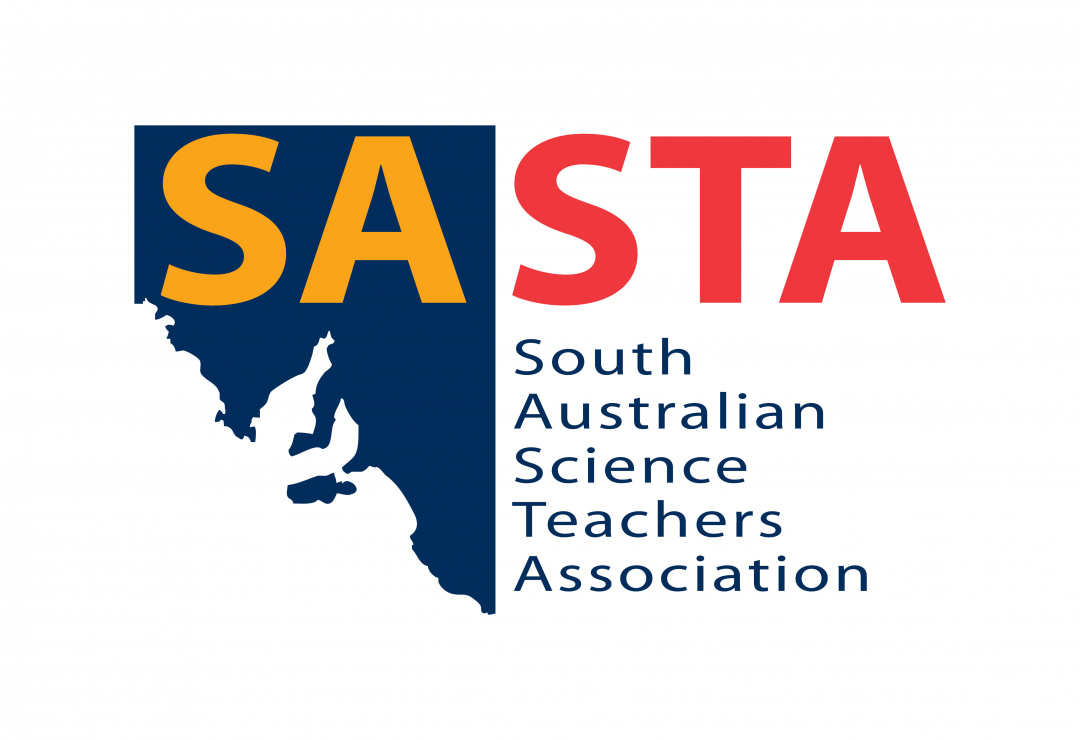Posted by SASTA
on 23/09/2024

The SASTA community is shaped by the diverse and passionate educators who bring science to life for students across the state. Among them, our country teachers play a vital role, often facing unique challenges yet continuing to inspire curiosity and learning in their classrooms. We want to shine a spotlight on these dedicated members, celebrating their contributions, exploring their stories, and acknowledging the important work they do in rural areas. Their resilience, creativity, and commitment to education ensure that science thrives.
Karoonda Area School primary students join the secondary science lab at lunchtime during Science Week to run an experiment about Whale Snot.
Jacob Dawson, Karoonda Area School
What inspired you to become a science teacher?
I decided to become a Science teacher after experiencing the passion and enthusiasm of my High School science teachers. Their excitement to share with us through practical experiences that helped us to build our understanding of the world around us.
Can you tell us about one of your proudest accomplishments or a new program/idea you’re running with your students?
My proudest accomplishment has been seeing students in my last 2 schools grow in their love for science and choose to study Chemistry and Biology at SACE level. In both schools, students didn’t see themselves as following a science pathway and ended up going on to further study because of the passion we developed.
What advice would you give fellow science teachers?
One of my first mentor teachers told me that we need to be passionate. No one else will be as excited about learning as we are and our students feed off this. We don’t want the bored teaching the bored – make your lessons interesting for you and your students.
Tell us your favourite science fact.
Grasshoppers have ears on their stomachs.

Brianna Harris, Burra Community School
What inspired you to become a science teacher?
Honestly, though I had some inspiring teachers, I had no intention of being a teacher after high school! I wanted to be a vet, and studied 2 years of Veterinary Bioscience at Roseworthy. For a few different reasons I ended up taking a year off to consider my options, and during a career counselling session, I completed a quiz that came up with Secondary Science teaching as a suggestion with high suitability for me, and the more I thought about it, the more I realised it was something I'd like to do. Now I'm here!
Can you tell us about one of your proudest accomplishments or a new program/idea you’re running with your students?
Last year I got my Year 7s to make Rube Goldberg machines out of everyday materials. One group went above and beyond, and designed a complex machine that ended with a Tim Tam falling into a cup of hot chocolate. It took them many, many attempts to get it right, but they were so determined they even stayed back after lesson to make modifications to their machine. The cheer they let out when they finally got the Tim Tam to fall in the cup gave me such a warm fuzzy feeling, and it's moments like that I do this job for!
What advice would you give fellow science teachers?
My advice for fellow science teachers, particularly early career ones, is to never be afraid to ask for help! Make sure to join as many networking groups as you can (like SASTA!) where you can meet other people to share ideas and even vent with. Make the most of PD opportunities - I've genuinely found the SASTA Early Career Teacher conferences incredibly useful. Remember that it's not just you, this job really is hard (but can be so rewarding), so don't feel bad for reaching out to others for resources or advice. It's what has got me through the last 5 years.
Tell us your favourite science fact.
There's so many! Probably the best one I've learned lately is that fast-moving, smaller animals perceive time more quickly than larger, slower ones. I guess in a way it's not surprising, but it still seems crazy!

Georg-jah Mitchell, Karoonda Area School
What inspired you to become a science teacher?
From a very young age, I was always intrigued by science. I loved discovering how things worked and understanding the world around me. As I grew older, I realised I also had a passion for working with children and making a positive impact on their lives. Teaching science became the perfect way for me to bring these two passions together. This is only my first year teaching but it is incredibly rewarding to see that moment of understanding light up a student’s face and to know I’ve helped foster their curiosity and love for learning.
Can you tell us about one of your proudest accomplishments or a new program/idea you’re running with your students?
One of my proudest accomplishments has been running a successful National Science Week at our school. We organised a range of engaging activities, including Elephant Toothpaste demonstration, looking through microscopes, and a whale snot experiment. It was great to see the students excited about science during these activities, and their enthusiasm and curiosity were infectious. The positive feedback from the students has been incredibly rewarding and motivates me to continue creating impactful science experiences.
What advice would you give fellow science teachers?
My advice to fellow science teachers is to focus on making the classroom a safe space where students feel comfortable making mistakes and learning from them. Encourage curiosity and emphasise that getting things wrong is a natural and essential part of the learning process. When students feel confident asking questions, experimenting, and even failing, they develop a deeper understanding of scientific concepts and build resilience in their ability to explore and discover. Creating this kind of supportive environment can help foster a lifelong love of learning and science.
Tell us your favourite science fact.
My favourite science fact is that diamonds form under pressure. Deep beneath the Earth's surface, carbon atoms are exposed to extreme heat and pressure, causing them to crystallise into diamonds. It’s a beautiful reminder that even in the toughest conditions, something extraordinary can be created.

Jamie Taylor, Mount Gambier High School
What inspired you to become a science teacher?
I was fortunate to grow up on a farm, where the outdoors became my classroom. From a young age, I had a strong interest in both sustaining biodiversity and better understanding the world around me, which led me to complete my first degree as an ecologist. However, I realised that to truly make a difference, the key was to inspire and educate the next generation. I also grew up witnessing close friends experience significant trauma and stress in their lives, I always felt a desire to be a support for students in similar situations. This combination of environmental passion and a drive to help students shaped my decision to complete post graduate study and become a science teacher.
Can you tell us about one of your proudest accomplishments or a new program/idea you’re running with your students?
My proudest accomplishment as a teacher, even if it sounds a bit cliché, is when I learn that my past students are making positive decisions and achieving their best in life, and I know that I played a part in their success. It’s incredibly rewarding to see the impact you’ve had on their journey, whether they are entering a science or environmental related career, or they have ended a dysfunctional cycle. When students take the initiative to reach out and personally acknowledge the influence I’ve had, it’s even more meaningful and reminds me of one of the reasons I became a teacher in the first place.
At a more personal accomplishment level, something I am proud of was returning to study and successfully completing further post-graduate studies while juggling teaching and a young family. I believe strongly in lifelong learning and modelling this concept to our students. While it was a big juggle, I was able to explore my interests and reconnect to learning and study from a student’s perspective.
What advice would you give fellow science teachers?
My advice to fellow science teachers is simple: cultivate curiosity, both in yourself and in your students. Sometimes we get caught up in the rush of covering content, but it’s that curiosity that fuels learning and creativity. In this fast-changing world, we all need to be lifelong learners, so don’t get stuck in a rut. Embrace new learning opportunities, and don’t be afraid to experiment with your own teaching methods. The best moments often come when you step outside of your comfort zone.
I’d also encourage teachers to consider the unique rewards of teaching in rural and regional schools. The often-close-knit communities and the opportunities to make a deep, lasting impact on students’ lives are unlike anything you’ll experience in a city. In rural settings particularly, your role as an educator often extends beyond the classroom, and you become an integral part of the community. The challenges may be different, but the personal and professional rewards are immense. You’ll find that the relationships you build with students and their families, as well as the connection to the environment around you, can create some of the best teaching experiences of your career.
Tell us your favourite science fact.
My favourite science fact is that nearly all the elements in the human body were made in stars. I love this because it highlights how interconnected life is.
In this Section
Archive
- February 2026
- January 2026
- December 2025
- November 2025
- October 2025
- September 2025
- August 2025
- July 2025
- June 2025
- May 2025
- April 2025
- March 2025
- February 2025
- January 2025
- December 2024
- November 2024
- October 2024
- September 2024
- August 2024
- July 2024
- June 2024
- May 2024
- April 2024
- March 2024
- February 2024
- December 2023
- November 2023
- October 2023
- September 2023
- July 2023
- June 2023
- May 2023
- April 2023
- March 2023
- February 2023
- January 2023
- December 2022
- November 2022
- October 2022
- August 2022
- July 2022
- June 2022
- May 2022
- April 2022
- March 2022
- February 2022
- January 2022
- December 2021
- November 2021
- October 2021
- September 2021
- August 2021
- July 2021
- June 2021
- May 2021
- April 2021
- March 2021
- February 2021
- January 2021
- December 2020
- November 2020
- October 2020
- September 2020
- August 2020
- July 2020
- June 2020
- May 2020
- April 2020
- October 2018
- September 2018
- August 2018
- July 2018

